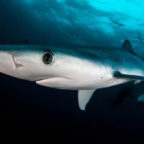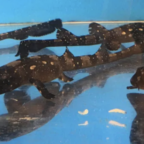
A new study finds that the presence of sharks can change coral reef ecosystems. Such research is becoming more important as both a top ocean predator and a crucial habitat decline. To humans, sharks are mythic and beautiful and terrifying – they can both clear the beach and inspire passionate conservation campaigns. It’s surprising, then, that scientists don’t actually agree on the extent to which sharks influence and shape their own ecosystems.
A new study published in the journal Scientific Reports wades into this issue and provides evidence that, just like humans, fish are afraid of sharks, and in some reef habitats, this fear actually changes the structure of coral communities. Though the study is limited – it applies to one reef in Fiji – it could help scientists understand a question that is becoming more crucial as both shark and coral populations decline worldwide.
“What inspired my work is that there’s this intense debate going on about whether sharks matter, ecologically speaking, but people were not approaching the question as thoughtfully as they could,” said Doug Rasher, a marine community ecologist at the nonprofit Bigelow Laboratory for Ocean Science in Maine and lead author of the study.
On land and at sea, many predators exert cascading effects on their habitats through their hunting habits. Sea otters eat herbivorous sea urchins, which in turn allows kelp forests to thrive. When Yellowstone National Park’s wolves were reintroduced, the area’s whole ecology was altered. Sometimes fear of a predator alone is enough alone to influence prey behaviors – wildebeest on Africa’s Serengeti, for example, will change their grazing patterns simply to avoid lions during certain risky times. As scientists put it, this creates a unique “landscape of fear.”
With sharks on coral reefs, however, the situation is complicated. They can move around far and wide, vary by species in how often, what and where they eat (reef sharks tend to stay in one area and eat smaller fish, while apex predators like tiger or bull sharks roam and eat bigger prey, including other sharks). Of course, fish hide when a shark prowls briefly nearby, but the systematic effects of sharks on their behavior and the landscape have been harder for scientists to measure rigorously. When they’ve tried, the results have been contradictory, said Rasher.
“There is no reason to believe that sharks aren’t shaping ecosystems, but one of the challenges we’ve had is how to measure that,” said Neil Hammerschlag, director of the Shark Research & Conservation program at the University of Miami, who wasn’t involved in the study. He said the paper made some good points about how to tease out these dynamics.
Rasher had conducted his PhD research around the pristine reef off Fiji’s southern coast, so he knew the area well. The near-shore reef contained large shallow zones, covered by just a few feet of water at high tide and barely any water at all during low tide. At high tide, reef sharks could come into the area and prey on orange spine and blue spine unicorn fish, but at low tide, sharks would leave and fish could safely feed in isolated, deeper lagoons. High tide was predictably a “risky” time to be a fish, and Rasher realized this provided a great natural laboratory for testing the question of whether sharks were influencing the reef.
Setting up cameras and conducting surveys, his team did find that fear of reef sharks shaped fish behaviors. At high tide, when sharks could be near, fish either left the area entirely or hid, and they didn’t feed on the seaweed as they do at low tide. Importantly, Rasher found there were visible cascade effects of this fear-based behavior. In the deep pockets of the reef, there wasn’t much seaweed because fish ate it, but seaweed would grow more freely in the shallow areas that were only accessible at high tide, when the fish were hiding. The sharks exerted a consistent influence that “appears to flow all the way to the base of the food web,” said Rasher.
Next, he plans to test for the effect in other similar healthy reef landscapes within the Indo-Pacific region. He thinks in many, less pristine and overfished areas, the decline of both reef sharks and reef fish will make it harder to observe these dynamics. In general, as climate change, ocean acidification, pollution and fishing affect coastal waters, seaweed has been thriving, sometimes at the expense of coral health.
Hammerschlag notes such research is relevant to efforts to recover shark populations in certain areas. As that happens, he said, “there might be winners and losers in the ecosystem.”
Rasher hopes his study “moves the conversation away from: ‘Do sharks ever matter?’ to ‘When and where do they matter?’”
“I think there is an urgency in understanding what their ecological roles are in nature so that we can understand the ramification of their loss,” he said.















Social Profiles